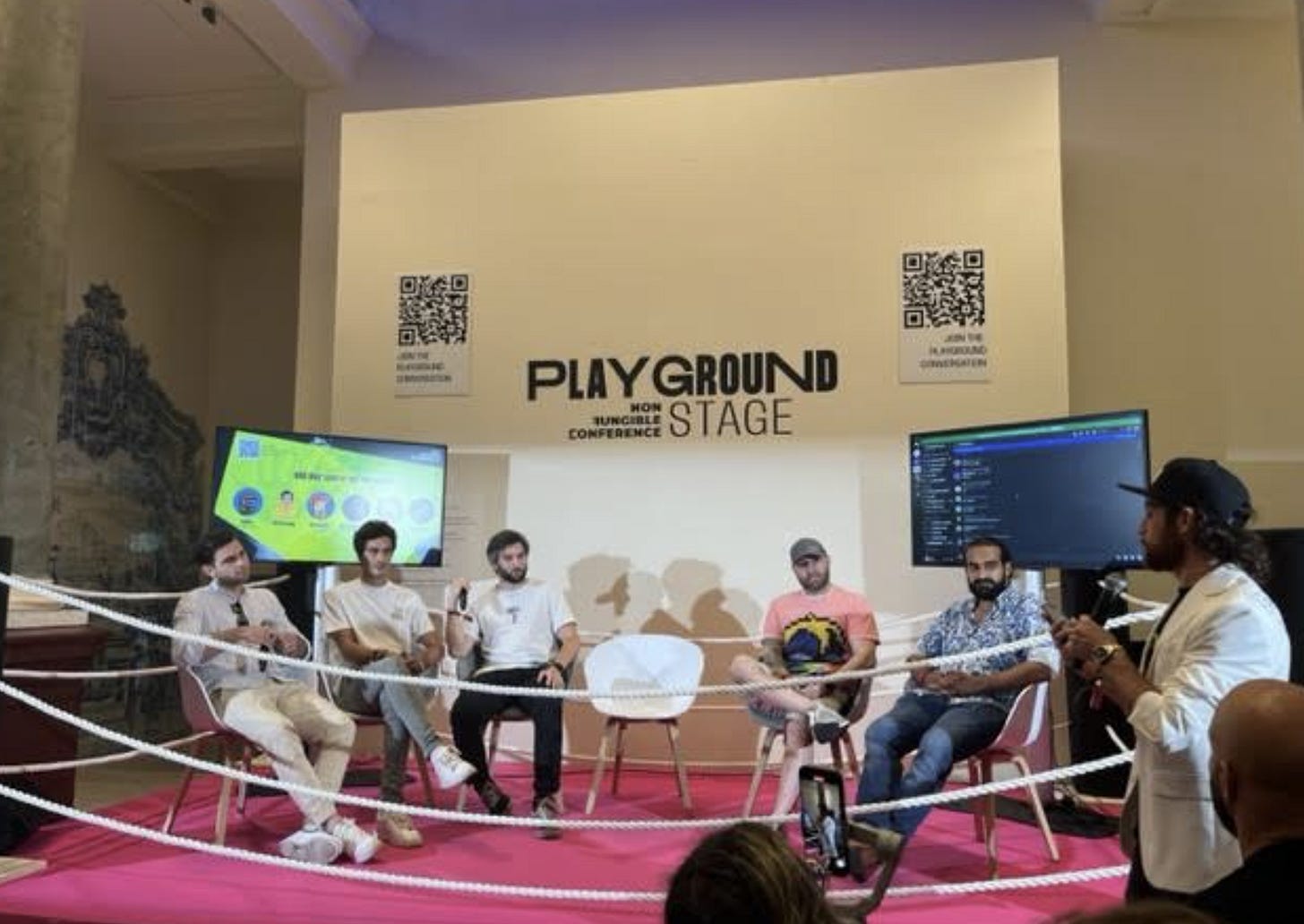Warmer Waters in Lisbon
Blubber Notes #48
Dear Future Whales,
In today’s note, I share some notes from my trip to Lisbon for the Non-Fungible Conference. Both Ordinals and Blur.io were hot topics and were heavily debated; I do my best to give both points of view. I also share a new project that may help collectors and collection creators to save some gas money. Let’s dive in!
Summary:
NFC Observations
Best Debate - Are Ordinals Here to Stay?
Will Blur kill or save the space?
Possible breakthrough for gas-efficient NFTs
📰 NFC Observations:
Size doesn’t matter - NFC Lisbon was my first European crypto conference, so every comparison I made was based on those I had attended in the United States. Overall, NFC seemed much smaller compared to events like NFT NYC, ETH Denver, and others; however, smaller does not mean worse! In fact, it was better!
Better debates/weak exhibition hall - Each presentation room was carefully curated (see Ordinal debate notes below), and the atmosphere was less commercial than what I had become accustomed to. I was able to mingle in a more intimate setting. I wish there were more exhibitors at the event, as I love chatting with people representing new technologies, infrastructure, and collections. I found the exhibit hall portion to be quite light.
All about culture: This conference had the most representation of artists from all mediums, including music, photography, and generative art. It also took place inside the renowned Pavilhão Carlos Lopes - this building, although newer, contained the popular tile work often seen throughout Portugal.
🤷♂️Best Debate - Are Ordinals Here to Stay?
I have to mention this setting. Again, it’s a smaller room. At the front, they designed the stage to look like a boxing ring. 5 seats in total, two on one side, two on the other with an open seat in the middle meant to separate those with opposing views.
After the initial question, members of the audience could volunteer to take the middle seat and take a side of the argument. If you weren’t brave enough to do so you were given custom cards to vote from your seat with red and green for yes or no. I highly recommend this forum for anyone hosting a future event.
So are Ordinals here to stay?
The consensus was that, of course, they are, as Ordinals are inscribed onto Sats permanently; however, are they a fad or trend?
Overwhelmingly, it seems to be a fad.
Here’s why:
Cost. It has become more expensive to inscribe. Inscription costs have increased by a factor of 10 since the beginning of ordinal creation.
Ethereum can do this too. According to the speakers, it is technically possible to put Ordinals or inscriptions on the Ethereum network, so the Bitcoin network does not have the market cornered here. One audience member, who is writing her thesis on Ordinals, argued that it is 99% more cost-effective to do so on Ethereum.
Limited user adoption. One speaker - an OG of BTC and an early minter of Ordinals - is even afraid to transfer one; in fact, he has had BTC refunded to his Ordinal wallet and is not sure how to get it out. If the true OG pros in the space don’t know how to do it, how can the rest of us be expected to? Ultimately, the network congestion primarily caused by Ordinals would have happened, regardless of whether or not Ordinals had come about - it goes back to scaling.
What would change this?
More developers are working on solutions to bring down the cost and make minting and managing of Ordinals less complex; I’d argue, however, that we are still at least 6 months away from any serious innovation here based purely on what I heard.
🛟Will Blur kill or save the space?
The panel had some heated takes. Here are a few:
Neutral take on Blur:
No single app can 'kill or save' the crypto space; it can only move things forward or not. In the case of Blur, it has been quite popular. It is alleged that a new airdrop is set to come out next month, and the panel was mixed on how it would work out.
The Pro argument for Blur:
Most web3 collectors regard NFTs as a financial asset, whereas OpenSea was not designed for this. Degens are in it for flipping, and Blur enabled this; it came with zero fees, and users could choose zero royalties, incentivizing traders and which improved short-term volume. The initial airdrops were positive for the space, adding short-term liquidity, albeit at the expense of liquidity providers.
Arguments against:
Blur helped move the market forward by making creators bear the burden. All panelists agreed that, whether it was Blur or not, royalties would take a huge hit at some point. By not enforcing the creator fee, Blur could take market share.
Related to the airdrops, it was thought to be deceptive that users did not know what they were farming for in its upcoming airdrop; so speculation has run rampant.
Also, as the space continues to evolve, many people 'outside' are looking in. They get their information on crypto from the news, which contributes to the confusion. One speaker quoted that there have been ~$3.4 billion in wash trades reported, predominantly through Blur; where one can see the same asset traded multiple times, not at all beneficial for sustainable growth.
🤔My take on Blur:
No one can deny the genius that Blur brought to the market in terms of onboarding thousands. They used a combination of brilliant marketing, zero fees, and zero or optional royalties. Going forward, it is a tool for professional trading, and its innovation around the use of bidding pools and airdrop farming is definitely having an impact on floor prices across the market.
Time will tell where we go from here. I hope that, by this time next year, people will be asking the question: 'Will SegMint kill or save the space?' I'd love for you to be part of it; join the waitlist here.
⛽A possible breakthrough for gas-efficient NFTs
I’m giving a major caveat on this one - I don’t believe the source code has been reviewed or released yet but J.page overlay provides a series of smart contracts which operate one layer above ERC-721 collection contracts. This provides a way of transacting NFTs more cheaply, up to 80% gas-related cost savings!!!
The project also claims that it’s backwards and forwards compatible, and provides a P2P marketplace component, so you won’t need to rely on a 3rd party such as opensea.
Let’s follow this one together and see if it delivers as promised!
Authored by Matt Bartlett, CAIA. Follow Matt on Twitter @MattBartlettVE
NOT INVESTMENT ADVICE
Please note the author has invested in all NFT projects mentioned in this article.
Please note that SegMint may offer investment products that invest in the asset class(es) or industries included herein.
The information herein represents the opinion of the author(s), but not necessarily those of SegMint, and these opinions may change at any time and from time to time. Non-SegMint proprietary information contained herein has been obtained from sources believed to be reliable, but not guaranteed. Not intended to be a forecast of future events, a guarantee of future results, or investment advice. Historical performance is not indicative of future results. Current data may differ from the data quoted. Any graphs shown herein are for illustrative purposes only.
This is not an offer to buy or sell, or a recommendation to buy or sell any of the securities/financial instruments mentioned herein. The information herein represents the opinion of the author(s), but not necessarily those of SegMint, and these opinions may change at any time. Non-SegMint proprietary information contained herein has been obtained from sources believed to be reliable, but not guaranteed. Not intended to be a forecast of future events, a guarantee of future results or investment advice. Historical performance is not indicative of future results. Current data may differ from data quoted. Any graphs shown herein are for illustrative purposes only.
In consideration of the receipt of non-fungible tokens (“NFTs”) from SegMint, you represent, acknowledge, accept and agree that: you received the NFTs as a gift from SegMint. You did not pay any consideration, monetary or otherwise, for the NFTs.
The NFTs are not an investment. Rather, the NFTs are digital memorabilia intended solely for entertainment purposes. As entertainment memorabilia given to you as a gift, the NFTs have no value and are not intended by SegMint to ever have any value. Neither SegMint nor anyone else will take or not take any current or future action that is designed in any way to maintain the value of the NFTs, or to cause their value to grow or increase. You must not attempt to obtain an NFT from SegMint if you view it as an investment.
As a condition of receiving the NFTs, you shall hold the NFTs for your own personal benefit, and you shall not act, and are not acting, on behalf of any other person or entity; except that, if you are an affiliate of an entity or person whose relationship or affiliation you have made SegMint aware of prior to your receiving the NFT, and SegMint consents to your receiving an NFT, you may receive an NFT. You shall not sell, assign, alienate, lease, lend, fractionalize, re-gift, convey or transfer in any way the NFTs (or any interest therein) to any other person or entity, even an affiliate. Any sale, transfer, assignment, or other action covered in the preceding sentence shall be void. You must not attempt to obtain an NFT from SegMint if you plan to sell or transfer it. The above content is for informational purposes only, you should not construe any such information or other material as legal, tax, investment, financial, or other advice. Nothing contained in this email constitutes a solicitation, recommendation, endorsement, or offer by the Author or any third-party service provider to buy or sell any securities or other financial instruments in this or in any other jurisdiction in which such solicitation or offer would be unlawful under the securities laws of such jurisdiction.
Cryptocurrency is a digital representation of value that functions as a medium of exchange, a unit of account, or a store of value, but it does not have legal tender status. Cryptocurrencies are sometimes exchanged for U.S. dollars or other currencies around the world, but they are not generally backed or supported by any government or central bank. Their value is completely derived by market forces of supply and demand, and they are more volatile than traditional currencies. The value of cryptocurrency may be derived from the continued willingness of market participants to exchange fiat currency for cryptocurrency, which may result in the potential for permanent and total loss of value of a particular cryptocurrency should the market for that cryptocurrency disappear. Cryptocurrencies are not covered by either FDIC or SIPC insurance. Legislative and regulatory changes or actions at the state, federal, or international level may adversely affect the use, transfer, exchange, and value of cryptocurrency.
Investing in cryptocurrencies comes with a number of risks, including volatile market price swings or flash crashes, market manipulation, and cybersecurity risks. In addition, cryptocurrency markets and exchanges are not regulated with the same controls or customer protections available in equity, option, futures, or foreign exchange investing. There is no assurance that a person who accepts a cryptocurrency as payment today will continue to do so in the future.
Investors should conduct extensive research into the legitimacy of each individual cryptocurrency, including its platform, before investing. The features, functions, characteristics, operation, use and other properties of the specific cryptocurrency may be complex, technical, or difficult to understand or evaluate. The cryptocurrency may be vulnerable to attacks on the security, integrity or operation, including attacks using computing power sufficient to overwhelm the normal operation of the cryptocurrency’s blockchain or other underlying technology. Some cryptocurrency transactions will be deemed to be made when recorded on a public ledger, which is not necessarily the date or time that a transaction may have been initiated.
· Investors must have the financial ability, sophistication and willingness to bear the risks of an investment and a potential total loss of their entire investment in cryptocurrency.
· An investment in cryptocurrency is not suitable or desirable for all investors.
· Cryptocurrency has limited operating history or performance.
· Fees and expenses associated with a cryptocurrency investment may be substantial.
There may be risks posed by the lack of regulation for cryptocurrencies and any future regulatory developments could affect the viability and expansion of the use of cryptocurrencies. Investors should conduct extensive research before investing in cryptocurrencies.






